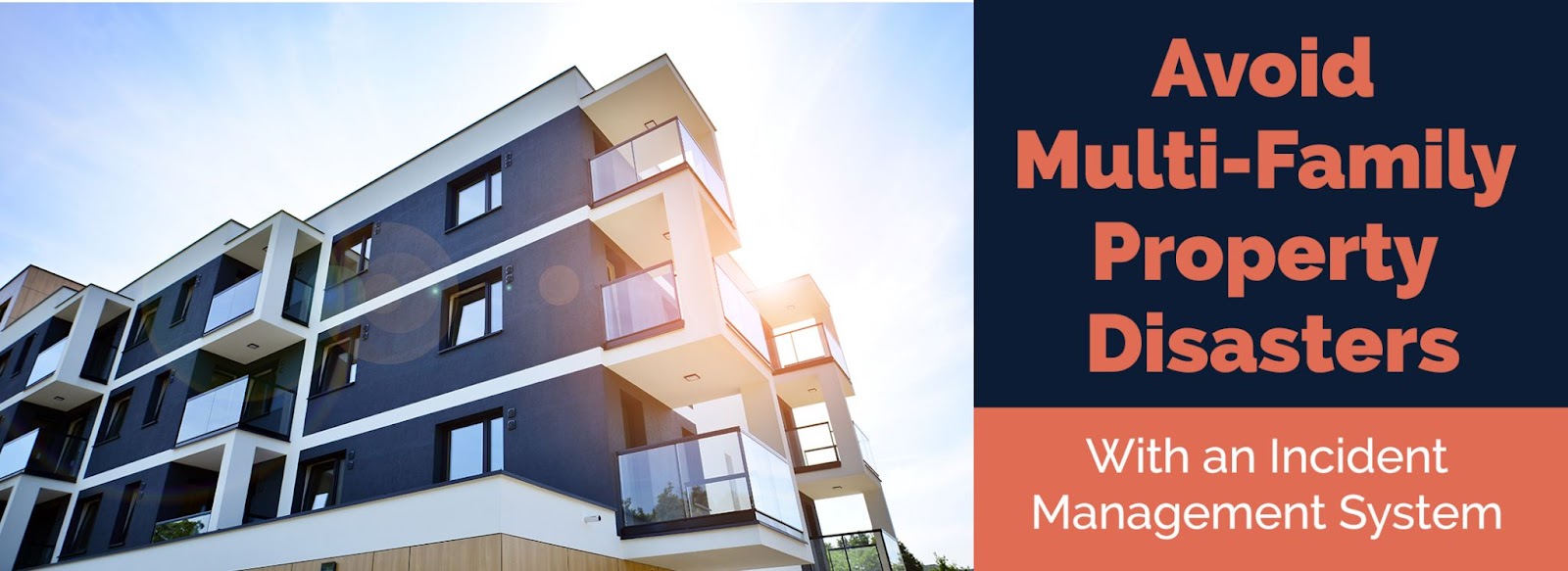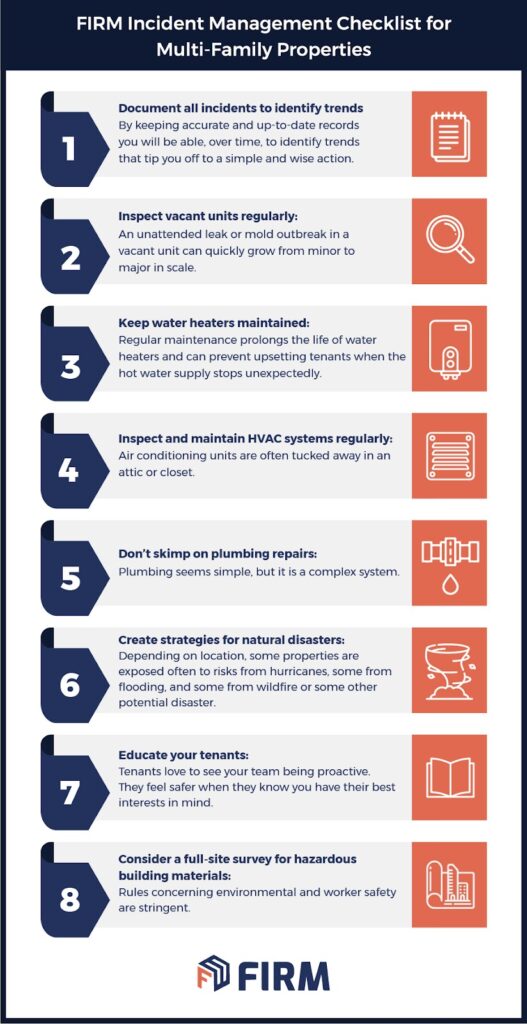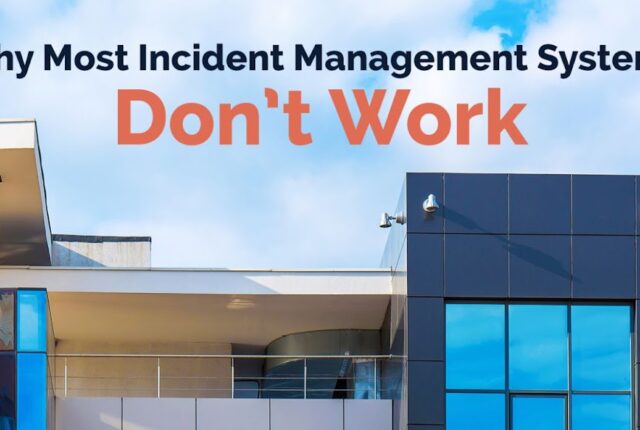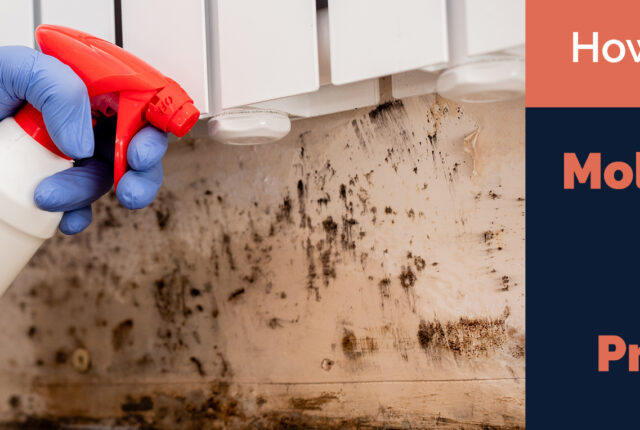
Avoid Multi-Family Property Disasters with an Incident Management System
Emergencies are commonplace for multi-family property owners. From burst pipes to hurricanes and floods, incidents requiring quick response are bound to happen. There’s no question about that. You have little control over when and where emergency situations occur, but you do have some control. Use the leverage you have.
There are two critical concerns that affect your ability to handle emergencies with minimum disruption to your business. You can plan for emergency incidents, and you can prepare for emergency incidents. Without a plan and without proper preparation, you’re vulnerable. Your business is open to calamity, and at some point you’ll get caught unprepared and paying more.
FIRM is an incident management team that takes the pressure off owners and managers of multi-family properties by giving them time to focus on tenant and property concerns. FIRM clients call one number, day or night, and the FIRM team takes it from there. You get daily updates throughout the project.
FIRM saves you time and money. Below is a checklist of the types of information you would find in the incident management system we prepare for clients.

FIRM Incident Management Checklist for Multi-family Properties
Please keep in mind that the particulars of your own incident response plan will vary depending on the needs of your particular property. This is not a complete list. Our hope is that the points below will help you understand the types of concerns often missed. We want you to be able to create your own strategy and be prepared to face any threat to your multi-family complex.
Document all incidents to identify trends: By keeping accurate and up-to-date records you will be able, over time, to identify trends that tip you off to a simple and wise action. For instance, perhaps a certain sewage line often needs repair. By adding up the associated costs, it’s plain that replacing the line entirely will save enough time, money, and headaches to justify the expense. Your aim is to seek business intelligence. FIRM keeps these records for clients and alerts them when the data provides a signal that warrants consideration.
Inspect vacant units regularly: An unattended leak or mold outbreak in a vacant unit can quickly grow from minor to major in scale. Make sure someone regularly inspects those units and documents their condition.
Keep water heaters maintained: Regular maintenance prolongs the life of water heaters and can prevent upsetting tenants when the hot water supply stops unexpectedly. Inspect each water heater monthly. Identify and repair any problems discovered. Look for water leaks, cracks, and wear. Check the outlet temperature to make sure it is neither too hot nor too cold. Your tenants will be glad to see you care about their comfort and safety.
Inspect and maintain HVAC systems regularly: Air conditioning units are often tucked away in an attic or closet. Because they are “hidden,” a small leak can turn into a big problem quickly. Inspect them often as part of your preventative management plan. Mold loves the dark and it loves water. You may need to keep the system in an unlit area, but you don’t need to let mold take over and create a real problem for your property and the tenant.
Don’t skimp on plumbing repairs: Plumbing seems simple, but it is a complex system. If you’ve a concern beyond a dripping faucet or toilet that runs too often, get help from a licensed plumber. There are areas where you can cut costs without hurting yourself or the property, and there are areas where you need expert help. Plumbing maintenance is crucial to the health of your property. Choose your plumber carefully.
Create strategies for natural disasters: Depending on location, some properties are exposed often to risks from hurricanes, some from flooding, and some from wildfire or some other potential disaster. Make sure your staff is trained on exactly what to do and when to do it during an emergency. This can get involved, but it’s well worth the effort. Preparedness planning helps take the stress off everyone concerned and gives your business the best chance of weathering a natural disaster without incurring unnecessary damage or prolonged periods of forced vacancies after the threat has passed. When you prepare your staff, you are helping yourself. Get them involved.
Educate your tenants: Tenants love to see your team being proactive. They feel safer when they know you have their best interests in mind. They can move quickly to either hunker down in place or vacate to a more advisable location as needed. Include them in your emergency planning. Explain what they should do, how they will be notified, and their role in executing emergency preparedness plans. Point out even the mundane things to them — what not to flush, how to deal with a clogged toilet, when to report water leaks (immediately) or signs of mold. Get them working with you to take care of the property they inhabit. Make sure your tenants feel like they are part of your team.
Consider a full-site survey for hazardous building materials: Rules concerning environmental and worker safety are stringent. During an emergency response, each affected unit must be individually tested for hazardous building materials. By obtaining a full-site survey in advance, you can reduce the time necessary to make repairs, since the inspection process has already been completed. But make sure the contractor you select is fully qualified to perform the inspections. This is another area you don’t want to skimp on. Our industrial hygientist inspectors have the right tools and training to get the job done correctly and fully documented to help you take advantage of this ahead-of-the-pack preparation.
Our Incident Management Team and Software Give You a Valuable Advantage
It is common to find a confused, desperate, scrambling-to-recover mess after any emergency incident, and the more widespread the situation the more difficult it becomes to get help from vendors or to secure the materials needed to make repairs.
Here’s a final tip: Continuity is essential in emergency responses. Set up your vendor relationships in advance. Negotiate prices and response times. Get it all down in writing. FIRM clients rest secure knowing their FIRM representative has already taken care of the details.
If you’re creating and managing your own emergency response plan or are counting on in-house capabilities for all requirements, remember your staff will still need to keep up with their regular duties. Make sure to plan ahead, prepare ahead, and be ready for anything nature, ruptured water lines, human error, or anything else can send your way.
Don’t stay soft and susceptible to disaster. Get FIRM. For help, call FIRM at (866) 914-2869.




